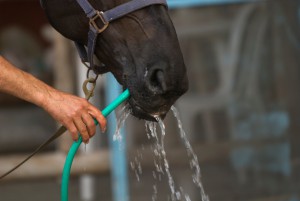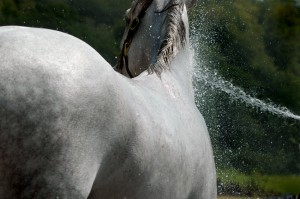 The current heat wave is a godsend for most of us after months of dreary, dull weather, but for your horses sudden excessively warm weather can be very detrimental, leading to dehydration or heat stroke if you don’t look after your horses correctly. WATCH OUT FOR HEAT STRESS If your horse is exposed to too much heat, and they cannot cool down sufficiently then they may suffer from heat exhaustion, which left untreated will lead to heatstroke. This can be due to exercising in hot weather but can also occur when horses are standing in overheated stables, trailers or horse boxes. Signs of Heat Stress include:
The current heat wave is a godsend for most of us after months of dreary, dull weather, but for your horses sudden excessively warm weather can be very detrimental, leading to dehydration or heat stroke if you don’t look after your horses correctly. WATCH OUT FOR HEAT STRESS If your horse is exposed to too much heat, and they cannot cool down sufficiently then they may suffer from heat exhaustion, which left untreated will lead to heatstroke. This can be due to exercising in hot weather but can also occur when horses are standing in overheated stables, trailers or horse boxes. Signs of Heat Stress include:
- High temperature
- Rapid pulse and breathing- often panting
- Signs of dehydration
- Usually horses will be dripping with sweat
- Horse may appear stiff, with abnormal gaits due to fatigue
- Restlessness or Lethargy
 If you think your horse is suffering from heat stress act quickly. Move them to a cool, shady, well-ventilated area. Remove any tack, and apply cool water, either using a hose or a sponge and bucket. Pay particular attention to the groin where skin is thinner, and neck which has many large veins. Short slow walks can also help your horse’s muscles to cool down. If your horse has been suffering from heat stress and it is left untreated it can lead to a more serious condition, known as Heat Stroke. Signs that your horse may be suffering from this include:
If you think your horse is suffering from heat stress act quickly. Move them to a cool, shady, well-ventilated area. Remove any tack, and apply cool water, either using a hose or a sponge and bucket. Pay particular attention to the groin where skin is thinner, and neck which has many large veins. Short slow walks can also help your horse’s muscles to cool down. If your horse has been suffering from heat stress and it is left untreated it can lead to a more serious condition, known as Heat Stroke. Signs that your horse may be suffering from this include:
- High temperature
- Skin is usually dry and warm to the touch
- Horses may be staggering around, and may even fall
- They can be unaware of their surroundings, and this can make them a danger both to themselves and to others.
- Failure to treat can lead to very serious complications
HEAT STROKE CAN LEAD TO SEIZURES, COMAS OR DEATH. IF YOU SUSPECT YOUR HORSE HAS HEAT STROKE PLEASE CONTACT YOUR VET IMMEDIATELY. By following a few simple rules while the weather is hot you can significantly reduce the risk of your horse suffering with problems due to the heat:
- PROVIDE PLENTY OF WATER! Having access to fresh, clean water is vital all year round, but as days get hotter horses will lose more water from their bodies in the form of sweat to keep themselves cool. This causes them to drink more, so make sure your horse has plenty of water available to them, and check troughs and buckets daily to make sure that the water source is clean.
- ALLOW ACCESS TO SHADE AT ALL TIMES. If possible, turn out in fields with shelter from the sun, or if stables are cool bring horses in during the day, to avoid the midday sun
- PROVIDE SALT! Even non-ridden horses will need access to a salt lick during the summer, as the hotter weather will mean they lose more body salts. If your horse is being ridden and sweats a lot, provide electrolytes to ensure that all important body salts are being replaced.
- RIDE DURING COOLER PERIODS. If at all possible do not ride during the hottest part of the day; instead try to ride early in the morning or late at night to avoid the heat, or if you have to work your horse when it is hot, keep to low intensity exercise, and cool your horse slowly after you finish working them.
5. WASH DOWN: Sponging off your horse after riding is particularly important in the summer when they are likely to sweat more, it helps the horse to cool down, and the dried sweat attracts flies.
- APPLY SUNCREAM! If your horse has any delicate pink bits of skin, applying sun cream to these areas will stop the skin burning.
Olivia Colton MSc Nutritional and Technical Coordinator, Feedmark











